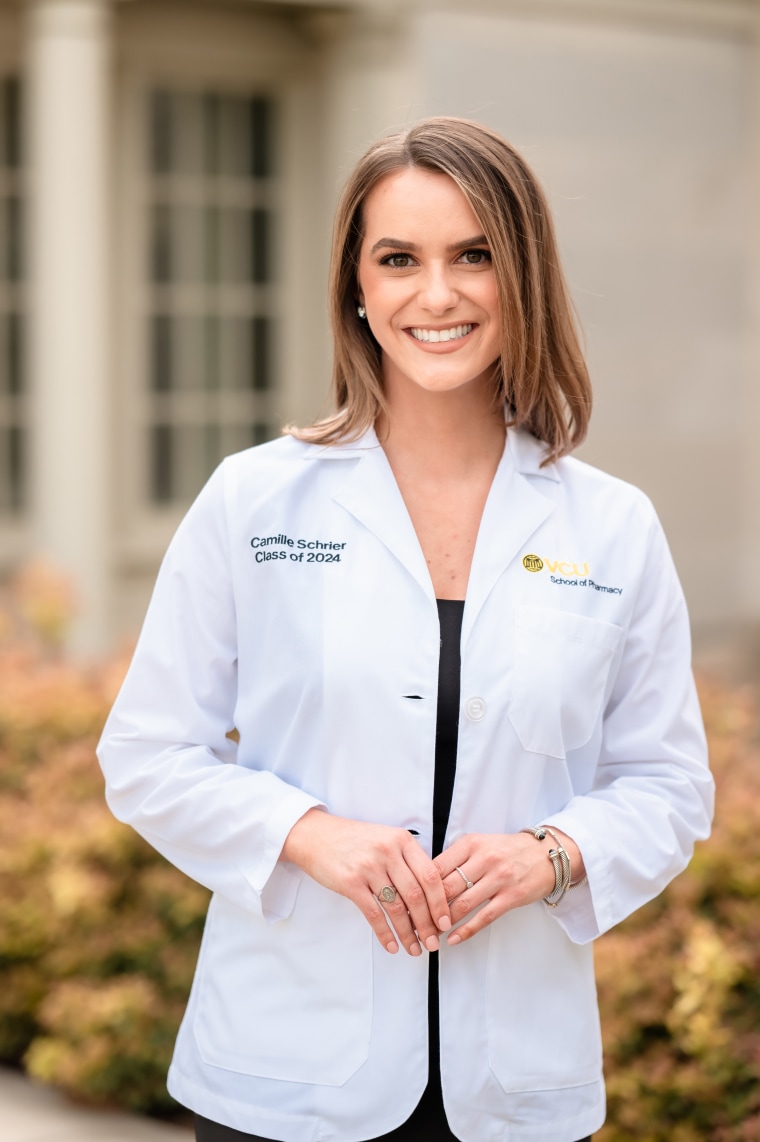Growing up, Camille Schrier experienced anxiety and depression. As an adolescent, she didn’t always recognize what it was, and as she aged, her mental health worsened. By the time she was in college, she experienced obsessive compulsive thoughts and disordered eating, as well. In the middle of her sophomore year of college, she became overwhelmed by her unmanaged mental health conditions and withdrew to attend college closer to home.

“I sought out mental health treatment for the first time,” Schrier, 27, Miss America 2020, of Richmond, Virginia, told TODAY. “That’s probably not the right way to say it. My parents forcibly took me to mental health treatment for the first time in my life.”Schrier was diagnosed with major depressive disorder, generalized anxiety disorder and an eating disorder, and visited a psychiatrist for medications to treat her conditions. Fine-tuning the dosing of medications often seemed difficult. That is until recently. She took a pharmacogenetics test that she said helped her doctor find the proper medications for her.
“My doctor is like, ‘I have a pharmacogenomics test that I just got in. I think you should take it. They assess for the way you are going to metabolize pain medications and all of these antidepressants, anti-anxiety meds,’” she explained. “(The test) said that (the medication I had been on since 2014) might not be the best medication for me.”
Pageants and the pandemic
Growing up, Schrier competed in pageants and enjoyed it. As she aged, she considered competing for Miss America but worried that being in the swimsuit competition would worsen her anxiety, depression and disordered eating.
“As someone that had recovered, or maybe not even fully recovered … with an eating disorder, the last thing I wanted to do was put myself in a situation that I was going to be directly judged on my body,” Schrier said. “But (the swimsuit competition) went away in 2018, so I was like, ‘Maybe I could do this.”
Schrier first competed — and won — locally to enter the Virginia state competition, which she also won. Six months later, she became Miss America 2020 after her talent competition captivated audiences and judges when she conducted science experiments, showing off her love of science, technology, engineering and math (STEM).
“I was absolutely thrilled, but in the same way, I had an underlying fear that I was going to compromise all the progress that I had made in the mental health part of my life,” she said. “There is such a microscope on you. The criticism, people tear you apart in a way that I have never experienced.”
Three months after winning Miss America, the COVID-19 pandemic began, and her public engagements stopped.
“I really thrived off of being in the experience, meeting people and seeing kids and having these appearances that I was able to do the real work … talking about STEM and doing science demos. And then I couldn’t do any of that,” she said. “It was just me and my house with the internet.”

That’s when the anxiety arose again. Even opening social media could dampen her mood. She reached out to her doctor, and he gave her a higher dose of antidepressants. But later, the medication was decreased too quickly.
“You have to taper (antidepressants) in a very specific way, and I don’t think we did that appropriately, and I ended up having these brain shocks,” Schrier said. “I’m now switching this medication dose, and I’m feeling like my brain is zapping.”
Her doctor lowered the dose before she moved back to Virginia for graduate school. At the same time, she experienced a flareup of another condition she lives with: Ehlers Danlos syndrome, a rare disorder that affects skin, joints and blood vessels. That’s when another one of her doctors suggested a pharmacogenomics test to evaluate how she metabolizes medication.
“The med that I’ve been on for a long time might have not necessarily been the best one for me,” she said. “How funny is it that literally my neurosurgeon was able to help me figure this out.”
Pharmacogenetics tests and antidepressants
Pharmacogenetics examines how someone’s genes impact how they metabolize medications. People take either a blood test or submit a saliva sample to learn if they have genes that influence how they process drugs.
Dr. David Oslin, professor of psychiatry at the Perelman School of Medicine at the University of Pennsylvania, recently conducted a study of pharmacogenomic tests for antidepressants.
“The tests we have now really don’t tell us anything about the disease ... and they don’t tell us about your particular response to a particular medicine. What everybody would love to have is a test that says, ‘This medicine is going to be the best,’” Oslin, chief of behavioral health at the Corporal Michael J. Crescenz VA Medical Center in Philadelphia, told TODAY. “What they really tell us about is the individual differences in metabolism for these medications, which would allow me, as a provider, to dose differently.”

Oslin, who has not treated Schrier, was the principal investigator in a recent study that looked at how the results of pharmacogenomics tests may help patients and doctors decide on an antidepressant and dosage. The clinical trial included 1,944 veterans, and some received a pharmacogenomics test, and some did not. The results were published in JAMA in early July.
“The science behind these tests is pretty sound,” Oslin said. “The tests are looking for the ways that people metabolize different medications, and that basic science has been mapped out pretty well.”
The researchers worked with providers treating veterans with depression at 22 Veterans Affairs sites across the country. Some patients and providers got the results from the pharmacogenomic test while others didn't.
“The test didn’t help most patients. What do I mean by that? Most of the patients don’t have a gene that predicts a change in metabolism for the medications that they’re on,” Oslin said.
“In the four-fifths of patients that didn’t have a gene that predicts changes in metabolism, it’s reassuring to know,” he added. "(But) it doesn’t sway you in terms of picking a different medicine.”
For the one-fourth of patients where the results did indicate a difference in how they metabolize a drug, the providers did shift prescribing practices, Oslin noted. Some providers avoided the drug all together, while others used a different dosage, but it's not clear if patients on different dosages had better outcomes, Oslin added.
For some patients, these tests are helpful: “If I know out of the gate that the patient is really a rapid metabolizer (of drug X), I know ... that if I use that medicine, I will have a lot more problems finding the right dose," Oslin explained.
Life as a graduate student
Schrier is pursuing a Doctor of Pharmacy degree at Virginia Commonwealth University and has two more years until she’s finished with her program. Since starting on her new drug regimen, she’s noticed a slight difference.
“My energy levels are so much increased that I feel like I can do more things, and it’s helped me feel a little bit more balanced,” she said. I’m feeling good about it.”

Schrier said it was important to tell her story so that others with mental health conditions feel less alone.
“For a time, I felt like a shell of a human being,” she said. “It took me a while to be able to talk about it because I had always tried to put on this façade of 'I’m fine.' If I can help by sharing information about the journey that I have been through then maybe someone can see themselves in me and identify that what they’re going through might not be what they have to go through.”
CORRECTION (Aug. 9, 2022, 9:19 a.m.): A previous version of this story misstated the Schrier won Miss America 2020 eight weeks after the Virginia state pageant. She won six months later. A previous version of this story also stated that her antidepressant dosage was increased too quickly, causing "brain shocks." It was actually decreased too quickly after being increased. The story has been corrected to reflect these changes.